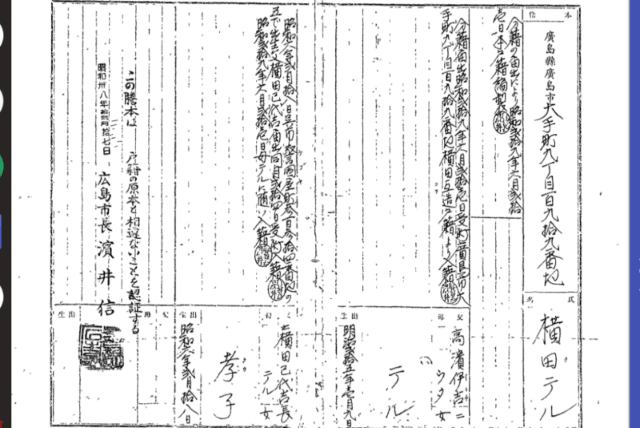Foreign lawyers or trustees often contact us regarding the whereabouts of Japanese heirs.
Japanese Citizen Documentation System
The citizen record system in Japan is the Koseki family register records. Finding relatives is easy if you have access to the family register.
However, it is challenging to access the family register registration. When asked for an heir’s whereabouts from outside Japan, we have to overcome many complicated tasks.
You must first understand the peculiarities and complexity of the Koseki family register registration.
The Difficulty Of Access To Family Register
First of all, family register registration is confidential information. It is not a system that allows you to search for a person by name.
Only direct relatives and professionals such as lawyers and administrative scriveners have access to family register registration.
To access the Koseki family register, you need to provide the permanent domicile (Honseki) of the target person and the name of the head of the family. Government offices will never search the permanent domicile for you for no matter what reason.
What Is The Permanent Domicile?
Permanent domicile is not easy to explain.
A permanent domicile is in the form of an address in Japan.
You can set your registered domicile anywhere in Japan. Some register domiciles at the Imperial Palace; others do at the Northern Territories. Only the imperial family can live in the Imperial Palace. Russia has occupied the Northern Territories since 1945. Therefore, it is not essentially Japanese soil.
The Koseki family register is managed by the local municipal government, not by the nation. Therefore, the permanent domicile is in the form of an address. In other words, the local government where the address is located manages the Koseki family register.
Original Meaning Of Permanent Domicile
The original meaning of the registered domicile was the address of the head family’s home. During the feudal era, more than 150 years ago, people could not move freely. The Koseki family register and registered domicile system is a remnant of the feudal era. Therefore, it is difficult for modern people to understand.
Permanent Domicile Could Show Social Caste
During the feudal era, Japan had a social caste system. At that time, there were isolated villages inhabited by outcastes (untouchables). Outcastes were only able to engage in the profession, such as animal slaughter and executioners. And outcastes can only marry outcastes.
In the old days, discriminated people set their permanent domiciles in the Buraku. Currently, as mentioned above, anyone can freely move their permanent domicile wherever they like. However, tracing an ancestor’s old family register tells us if the person was once an untouchable.
After abolishing the social class, the discriminated class formed a pressure group against the government to develop preferential policy eliminating discrimination. The pressure group still has a strong influence on local governments. Therefore, the Koseki family register is treated as entirely confidential information.
The issue of Buraku in Japan is the same as that of American Indians, Africans in the US, and Aborigines in Australia. Preferential policies to eliminate discrimination are supposed to overprotect the rights of formerly discriminated people.
Koseki Family Register Is Only For Japanese Nationals
Only Japanese nationals can register their family register. If you are a foreign resident, you will have a Juminhyo resident registration, but your family relationship will not be recorded in your resident registration. Therefore, it is not possible to investigate the whereabouts of heirs with residence records. Besides, foreigners have been able to register as residents since 2012. From this point, we can see that the registration of foreign residents in Japan was flawed.
If you are a foreigner with a Japanese spouse, your spouse’s Koseki family register will record your name. But foreign names can only be registered in Japanese characters. Registration in alphabets and other foreign language characters is not possible.
In any case, it is almost impossible to search for foreign nationals living in Japan from the Koseki family register. It’s because no name search is available, and the spouse’s permanent domicile is hardly provided.
Name In Japanese Characters
The Japanese name in the alphabet produces a myriad of combinations of names in the Japanese character.
Japanese characters are ideograms. There are always multiple pronunciations for Japanese kanji.
The alphabet is a phonetic character (Phonogram). Since Japanese characters have multiple pronunciations, it is impossible to restore the Japanese character name from the alphabetic name.
Only Japanese-character names are used in Japan’s official records. If there is only an alphabetic name, we have no choice but to guess the Japanese character’s name. We have no choice but to search for the person with multiple names of Japanese characters. It is inefficient to work without the exact name in the Japanese character.
Japan’s Personal Information Protection Law
Only the public available personal information in Japan is the officers in the commercial register and the real estate registry owners. Moreover, it is not possible to search by name in the registration of these Legal Affairs Bureaus.
Japan’s personal information protection law is strict. Also, no exception rules have been established for the disclosure to third parties, even for issues that legally require investigation.
Summary
There are various problems in finding heirs from abroad. It is tough to clear these problems.
If the following information is not available, we may not be able to undertake the location investigation.
- Immigration record when Japanese immigrated abroad (copy of family register)
- Know the name and address of one of your Japanese relatives.




